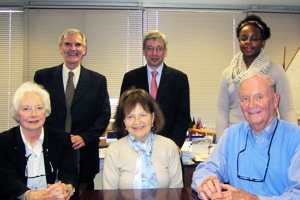On Campus
Justice Programs Office Hosts Buenos Aires Justice for Learning Exchange on New Judicial System

SPA’s Justice Programs Office hosted Justice Horacio Corti, a member of the Buenos Aires Magistrates Council representing the judiciary, to exchange ideas from December 4-6 on issues relating to judicial independence, shared by both Argentina and the U.S.
The council is overseeing the development and administration of a new judicial system for Argentina’s capital. The new structure will provide for substantially more autonomy than under the previous federal system, a process similar to what occurred in the District of Columbia in 1976.
Last fall, the School of Public Affairs (SPA) and the Buenos Aires Magistrates Council signed an agreement to promote an exchange of information and experience on these issues. The Justice Programs Office (JPO) has been working with the Magistrates Council, U.S. judicial system officials, and faculty within SPA and the Washington College of Law (WCL) to tackle common areas of interest.
Last week’s meetings focused on both the interrelationship of the judicial function and legislative budgetary authority and addressing fiscal implications of judicial decisions – topics of particular interest to Justice Corti, an expert on how budgetary authority impacts human rights. During his visit to JPO, Justice Corti met with a host of judicial experts, including JPO Professor Caroline S. Cooper; Judge Andrew Sonner (ret.), of the Maryland Court of Special Appeals; Tom Haran, retired cultural attaché for the American Embassy in Buenos Aires who initiated a justice reform educational initiative while posted to Argentina; Georgetown University Law School professor Margaret Farrell, a former WCL faculty member; and Vanessa Ongala, Kogod/BA ’12, a part-time assistant for the JPO, served as translator for the meetings.
In November, Dr. Daniel Fabregas, a member of the Council representing the Bar of the City of Buenos Aires, met with Dean Romzek, Provost Bass, and Professor Cooper to discuss the agreement preliminarily and areas of common interest anticipated to be addressed.